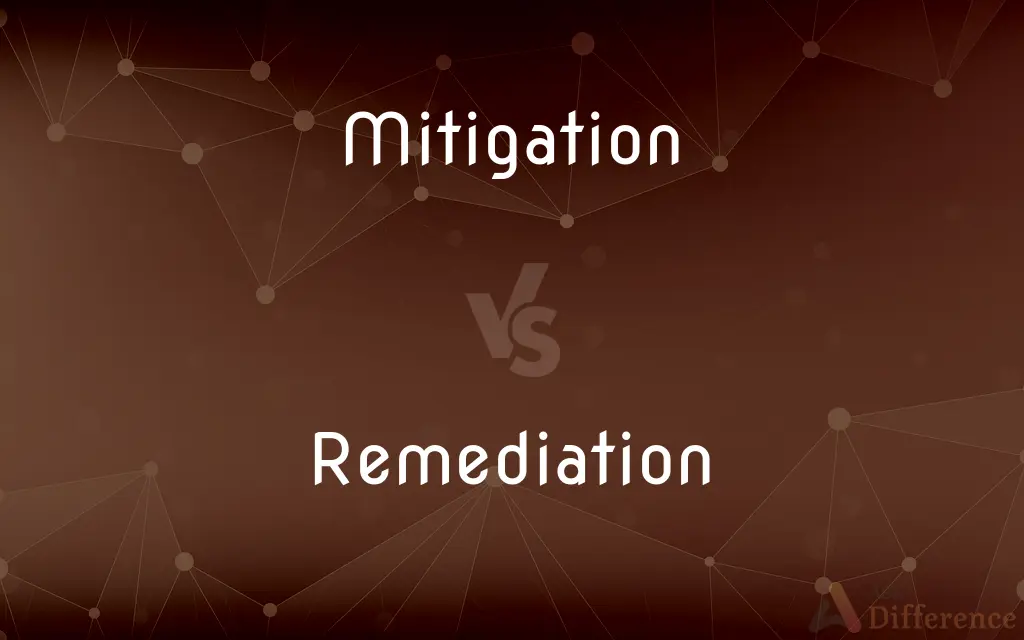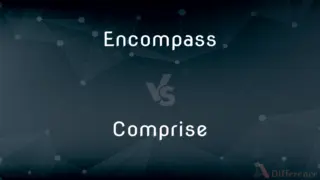Mitigation vs. Remediation — What's the Difference?
Edited by Tayyaba Rehman — By Urooj Arif — Updated on March 24, 2024
Mitigation involves reducing the severity of something, while remediation focuses on correcting or fixing a problem.

Difference Between Mitigation and Remediation
Table of Contents
ADVERTISEMENT
Key Differences
Mitigation refers to the actions taken to reduce the severity, seriousness, or painfulness of something. It's about lessening the impact of an event or condition without necessarily resolving the underlying issue. For example, in the context of environmental hazards, mitigation might involve strategies to lessen the impact of future floods. On the other hand, remediation is the process of correcting or removing pollution from the environment or fixing a problem. In the context of environmental cleanup, remediation would involve actions to remove contaminants from a polluted site to restore it to its original condition.
Mitigation strategies are often implemented as preventative measures before a problem occurs or to lessen ongoing issues. They are particularly relevant in risk management and disaster preparedness, where the goal is to minimize potential damage. In contrast, remediation is a reactive process, initiated after a problem has been identified. It aims to address and rectify the cause of an issue, such as removing toxic substances from water or soil to eliminate a health hazard.
While mitigation can be seen as a form of risk management, focusing on reducing or altering exposure to hazards, remediation deals with the direct intervention to remove or treat a problem. Mitigation might include building levees to reduce flood risk, whereas remediation would involve cleaning up after a flood has occurred, removing water, and restoring damaged areas.
The effectiveness of mitigation measures is often measured by their ability to reduce potential harm or prevent the worsening of a situation. Meanwhile, the success of remediation efforts is judged by their capacity to eliminate or fix the underlying problem, thereby removing the hazard or restoring the environment to a safe condition.
Both mitigation and remediation are crucial components in managing environmental issues, public health concerns, and disaster response. Mitigation works to prevent or lessen the effects of future events, while remediation focuses on addressing and solving existing problems.
ADVERTISEMENT
Comparison Chart
Definition
Actions taken to reduce the severity of an event or condition.
Correcting or removing a problem or pollution from an area.
Focus
Prevention and reduction of impact.
Direct intervention to fix or restore.
Application
Before or during an issue to lessen its impact.
After identifying a problem to correct it.
Examples
Building levees to reduce flood impact.
Removing contaminants from polluted sites.
Outcome
Reduced risk or impact of a problem.
Elimination or fixing of the underlying problem.
Compare with Definitions
Mitigation
Focuses on Lessening Impact.
Greenhouse gas emission reductions to mitigate climate change effects.
Remediation
Correcting Issues.
Using bioremediation to clean up oil spills.
Mitigation
Preventative Measures.
Vaccination campaigns to mitigate the spread of diseases.
Remediation
Requires Specific Actions.
Removing asbestos from buildings to remediate health risks.
Mitigation
Can be Ongoing.
Continuous cybersecurity updates to mitigate the risk of hacking.
Remediation
After-the-Fact Approach.
Remediation efforts following a chemical spill.
Mitigation
Involves Planning and Strategy.
Developing emergency evacuation plans as a mitigation effort against disasters.
Remediation
Aimed at Restoration.
Restoring a wetland area that has been degraded.
Mitigation
Risk Reduction.
Implementing stricter building codes in earthquake-prone areas is a form of mitigation.
Remediation
Direct Intervention.
Remediation of lead-contaminated water supplies.
Mitigation
To make less severe or intense; moderate or alleviate.
Remediation
The act or process of remedying something that is undesirable or deficient
Remediation of the pollution from the factories.
Mitigation
To make alterations to (land) to make it less polluted or more hospitable to wildlife.
Remediation
The act or process of providing remedial education
Remediation of poor writing skills in college students.
Mitigation
A reduction or decrease of something harmful or unpleasant.
Remediation
The act or process of remedying a situation.
The site required extensive environmental remediation before it could be used for other purposes.
Mitigation
The act of mitigating, or the state of being mitigated; abatement or diminution of anything painful, harsh, severe, afflictive, or calamitous; as, the mitigation of pain, grief, rigor, severity, punishment, or penalty.
Remediation
Act of correcting an error or a fault or an evil
Mitigation
To act in such a way as to cause an offense to seem less serious
Mitigation
A partial excuse to mitigate censure; an attempt to represent an offense as less serious than it appears by showing mitigating circumstances
Common Curiosities
Why is mitigation important?
It helps prevent problems from occurring or reduces their impact when they do occur.
Is remediation always possible?
While not all problems can be fully remedied, many can be significantly improved through remediation efforts.
What makes remediation critical?
Remediation is essential for correcting problems and restoring safety and environmental health.
How are mitigation strategies developed?
Through risk assessment and planning to lessen potential future impacts.
What is the main difference between mitigation and remediation?
Mitigation focuses on reducing severity, while remediation aims to correct or fix issues.
What are common remediation methods?
Methods include physical cleanup, chemical treatment, and biological processes.
What role do governments play in mitigation and remediation?
Governments often set regulations and provide resources for both mitigation and remediation activities.
Can mitigation and remediation be used together?
Yes, they often work in tandem, with mitigation reducing risks and remediation addressing existing problems.
Can mitigation save costs in the long run?
Yes, by preventing or lessening damage, mitigation can significantly reduce future expenses.
How do mitigation and remediation relate to sustainability?
Both are crucial for sustainable development, ensuring that current and future risks are managed responsibly.
What challenges exist in remediation projects?
Challenges include technical difficulties, high costs, and the need for long-term monitoring.
Are there careers focused on mitigation and remediation?
Yes, many professionals work in fields like environmental science, disaster response, and public health.
How does climate change relate to mitigation and remediation?
Mitigation efforts aim to reduce greenhouse gas emissions, while remediation might address specific environmental damages.
Can technology advance mitigation efforts?
Yes, technological advancements can enhance our ability to predict and lessen the impact of many risks.
Can community involvement impact mitigation and remediation efforts?
Community engagement is essential for effective mitigation and successful remediation, as it ensures local needs and knowledge are considered.
Share Your Discovery

Previous Comparison
Encompass vs. Comprise
Next Comparison
Soprano vs. TrebleAuthor Spotlight
Written by
Urooj ArifUrooj is a skilled content writer at Ask Difference, known for her exceptional ability to simplify complex topics into engaging and informative content. With a passion for research and a flair for clear, concise writing, she consistently delivers articles that resonate with our diverse audience.
Edited by
Tayyaba RehmanTayyaba Rehman is a distinguished writer, currently serving as a primary contributor to askdifference.com. As a researcher in semantics and etymology, Tayyaba's passion for the complexity of languages and their distinctions has found a perfect home on the platform. Tayyaba delves into the intricacies of language, distinguishing between commonly confused words and phrases, thereby providing clarity for readers worldwide.














































